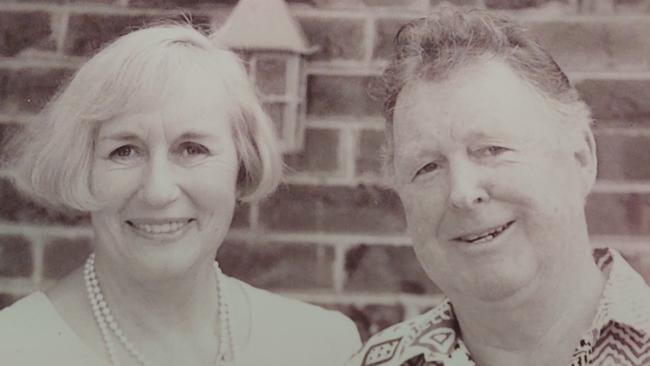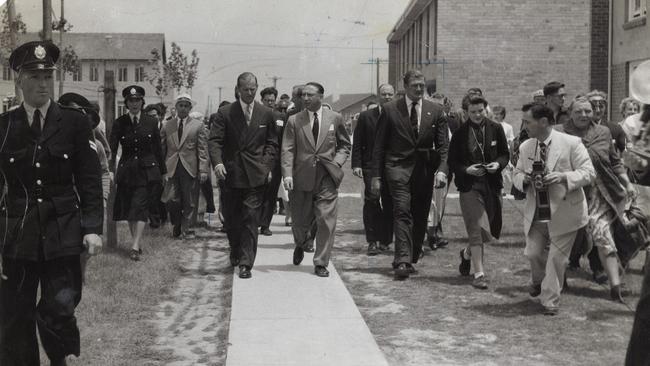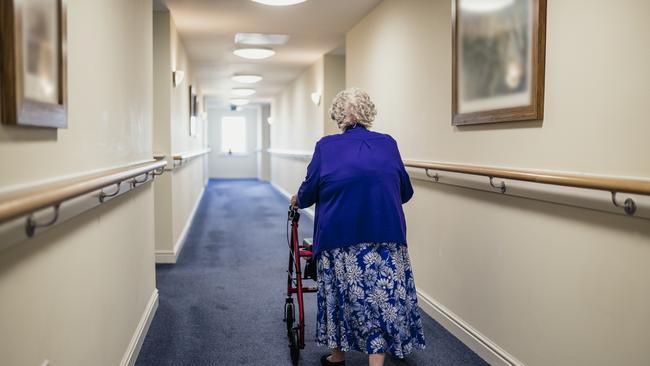A Christmas tale of guilt and loss in the cruel fog of dementia


But there she was painstakingly pronouncing the words phonetically, the way she had taught thousands of kids to read and write as a primary school teacher.
Almost on cue, one of her former students, now a carer in the dementia wing, entered Mum’s room.
“Your mother’s a lovely lady. She taught me at Olympic Village Primary School.”
Olympic Village – the suburb born out of the 1956 Melbourne Olympics. God only knows what athletes made of their village of cement houses and single brick one up, two down flats but they were only residents for a fortnight. By cruel design, the housing is blazingly hot in summer, bone shakingly cold in winter. After the Olympic flame was extinguished, it became a public housing estate with Australia’s migrant population mingling with tough working class kids.

Back in the 1970s, Mum taught young Vietnamese kids to read and write English. By the time of her retirement, it was Sudanese kids who were taught the intricacies of the English language by rote phonics.
The Pettingill family’s lieutenant, Dennis “Mr Death” Allen was one of the school’s alma maters. My father, also a teacher, used to joke that the name of the man who used to invite people over to his Richmond home to murder them, should appear on the school’s honour board.
On another occasion while my father spoke of the house system much beloved of private schools, my mother opined that Olympic Village PS also boasted four houses with four distinct colours and names to create a sense of identity and attachment among the young students.
“Surely, one of them is Ryan and Walker House,” my father quipped, in reference to the last man hanged in Australia, Ronald Ryan and his accomplice in escapology, Peter Walker. Neither of them were old boys of Olympic Village Primary School as far as I know. It made me laugh then and makes me laugh now more than it probably should.
I’ve followed my Mum’s dementia ride closely. Ten years ago, it showed as a frustrating habit where she told the same stories over and over. An anecdote ended only to be revisited within minutes.
She had been assessed by a memory clinic after a mild stroke seven years ago and again five years later. I have the reports which show a decline in memory function, the accepted gradations of dementia moving slowly, inexorably into double figures and intellectual oblivion.
Now I have a certificate completed by her doctor indicating “permanent intellectual impairment and disability.”

Whether it’s the contents of a newspaper or the straps that run along the bottom of the screen of a news bulletin, Mum will read them out loud. Perhaps with dementia there are moments of lucidity, of clarity and with them a sense that she’d be damned if she was going to let her language skills go. I’ve realised she is practising a teacher’s skill, albeit in a fog of lost memory and she is sticking to every lesson she once taught children.
There are a lot of misconceptions about dementia. Some see it as regressive illness, a slow, torturous return to childhood, infancy and then finally the helplessness of a neonate.
But that is not really how it works. It is certainly regressive, a degenerative disease of the temporal lobe that in my mother’s case rendered short term memory dysfunctional first. The ability to recall a phone number, a face or a name gone while long term memory remained vivid.
This led to some strange outcomes. When she came to visit some years ago, we ventured out to a Japanese restaurant for a birthday celebration. A fine time was had by all or so I thought but afterwards my mother pulled me aside.
“I don’t want to go back to that place.”
Why?
Memory had locked on to her life as a young teen on the southern tip of the South Island of New Zealand in wartime, of sirens screaming and drills where she raced to subterranean havens in the event of bombing raids.
Why anyone would think Invercargill was the sought-after jewel in the crown of Imperial Japan is anybody’s guess but that was her memory and there was no shifting it.
The day before I discovered my Mum’s tilt at bilingualism with the help of Il Globo, I took her out for a drive. It was a bit of testing on my part. We drove past a few old haunts, the golf club, sports grounds, and the family home. There was recognition but not a lot. Names of neighbours she had been able to recall six months earlier had now left her. Long term memory, too, is disappearing.
It’s left me in a maelstrom of anxiety and guilt – the two most pointless of all emotions but the hardest to budge. Anxiety because I know there may be a genetic disposition to some forms of dementia. On my reading, it is quite rare but every time I freeze over a name or a number, I’m enveloped by a sense of dread supercharged by the thought of brain rattling amounts of alcohol and one or two illicit substances consumed along the journey. Is this the way my end will come, too?
And guilt. Oh boy, the guilt most of all. As my mother whiles away the hours in a chair in her little room in a dementia wing, I know I’m the one who put her there.

It had to happen. She had long ago been unable to care for herself. Her husband, my stepfather, is strong in the mind but at 97 too frail to provide what is essentially intensive 24/7 care. The truth is, Mum should have been placed in residential care at least two years earlier but as the pandemic gave rise to Covid horror stories I could not bring myself to do it.
The guilt reaches into the subconscious. Is Mum in a home, a residence, or more darkly, a facility? I’m never quite sure what to call it. But it is a good place that we took time to find. She is comfortable, the staff are caring, the food is good, and I no longer fret about her having a fall and lying injured and helpless. One of her friends had taken a tumble in her own home and lay unattended for more than two days, alone, dehydrating and on the verge of death until luck intervened, and she was rescued.
Just to amplify that dark emotion, this will be Mum’s first Christmas in residential care. Phone calls, flowers and gifts can’t assuage it. The Christmas trinkets and bunting around her room stand as a mockery. She won’t be alone on Christmas Day, but she will be detached from family.
I took Il Globo from her hands and replaced it with the Herald Sun. She began mouthing the headlines and subs in a language more familiar.
It was time to go.
“I love you, Mum.”
She nodded, smiled and returned to reading out loud.
I wondered if it would be the last time I would see her and then pondered how much longer she could disintegrate before my eyes before some form of mercy intervened. And then the guilt returned.



The last time I saw my mother she was reading out loud from Il Globo – the bi-weekly Melbourne Italian language newspaper. She can’t speak Italian, let alone read it.